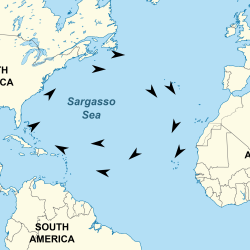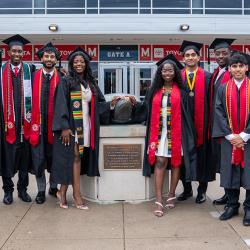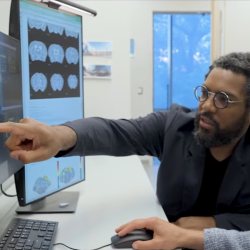How a UMD Professor Helped an Oscar Nominee Take Flight
Weighing whether the studio he runs should help produce a new film, Distinguished University Professor of Biology Sean B. Carroll knew that “All That Breathes” would be a beautiful story about humanity’s responsibility to—and place in—the natural world.
He didn’t foresee that the documentary about two brothers who nurse injured birds of prey back to health in New Delhi would win its categories at the Sundance and Cannes film festivals and a host of rave reviews—or that it would have him pondering where to get a tux for the 95th Academy Awards next month. The film, which is up for best documentary feature, has its small screen debut tonight on HBO and HBO Max.
“I could say it’s so unexpected that it feels like buying a winning lottery ticket, but it’s more like just finding a winning lottery ticket,” said Carroll, the Andrew and Mary Balo and Nicholas and Susan Simon Endowed Chair at the University of Maryland. “It has been a magic ride for all involved.”
Carroll worked on the film, directed by Indian filmmaker Shaunak Sen, as an executive producer through Tangled Bank Studios, an arm of the Howard Hughes Medical Institute. A pioneer of the field of evolutionary biology and an author science books for general audiences, he also serves as vice president for science education at the nonprofit life sciences giant based in Chevy Chase, Md.
The small studio has about 20 employees pursuing 10 active film projects, Carroll said. While “All That Breathes” might be an outlier in its relative lack of emphasis on formal science, it embodies themes that have been at the core of Tangled Bank’s mission since he founded it in 2011—and no one who sees the story of brothers Mohammad Saud and Nadeem Shehzad is likely to leave the theater unmoved, he said.
He spoke to Maryland Today about why the film became a surprise awards-circuit juggernaut, and what comes next.
Was getting behind this film a no-brainer from the start?
No, I actually thought this one was tough—a very intimate portrait of these brothers and their families and where they live, which is in a part of the world most people here don’t know much about. I couldn’t predict how an audience would react. Going into Sundance, there wasn’t much interest in the film, and because Sundance last year was virtual, we couldn’t even catch the reaction from audiences. And then, oh my gosh, it won (in the film festival’s World Cinema Documentary category). And we said, “Hmm, wonder what that means?”
And here you are preparing for the Oscars. Why did the film grab audiences’ attention?
I think the first thing is the authenticity. The way it’s shot, you’re really a fly on the wall seeing real situations. Shaunak Sen spends so much time with the brothers that, as he explained it, once he got yawns on camera, they were no longer camera-conscious. He was in the background so he could catch the natural action of their day, their work with birds, their interactions with their family and each other.
Secondly, you feel this intimate privilege to look into the lives of these brothers; you can’t help but admire what they’re doing. This is a noble, noble endeavor against great challenges, and they have been doing this for 20 years out of their own pocket. They’re living and working in a challenging situation: They’re raising families, they are part of the Muslim minority population of Delhi, they have no formal training to do what they do, and the list goes on.
Why do they do it?
I don’t want to spoil the movie by giving away the lengths to which they go, but they are extremely dedicated. The title “All That Breathes” comes from their mother, who raised them with that ethos toward all living things. These brothers are philosophers; there are gems in this movie from their thinking about our relationship to the natural world, about their own aspirations and what they want out of life. So what’s the message? I think one of them is, if these guys can lean into it like they do, perhaps we can all try just a little bit harder to make things better.
Tangled Bank Studios produces very science-oriented films—fighting HIV/AIDS, the race for COVID vaccines, our bodies’ microorganism communities, etc. Is this in a similar vein?
You see nature in the film and learn about its struggles in this polluted, crowded city, and there are some science-related themes, but there’s no ecologist talking head being interviewed, for instance.
What we are trying to do is tell stories about what can reverse losses in nature, and put a spotlight on the people doing it. This is where “All That Breathes” is very compatible with the editorial voice of the studio. We’re not focusing on stories of evildoers—Who ruined this river? Who drilled this mine?—but asking what can be done. Those stories are under-told. We have an eight-part series coming out this summer that will focus directly on that.
One of the challenges of storytelling that involves science is that there's the expectation that as scientists, we have this objective information, right? If people only knew what’s in our heads, the world would be OK. But that's not how people relate to things, or shape their thoughts and feelings. It’s much more in the heart. It's through empathy and hope and people's aspirations and dreams—those are what we have to appeal to for broad audiences to understand what science can contribute to our culture.
Are you going to the Academy Awards ceremony?
That’s the plan. We haven’t gotten ticket information yet, but there are seven or eight of us we’d love to be able to get to the Oscars—the director, two producers (Aman Mann, Teddy Leifer), two executive producers (Carroll and Tangled Bank colleague David Guy Elisco) and the brothers. It’s a pretty hot ticket, though.
And I want to go even though dressing up for me is below dental work in terms of things I prefer. I mean, I didn’t go into academia to dress up. Someone asked me what designer I’d be wearing. I said I’d prefer Levi Strauss.
What next for you and the studio?
I look forward to working with a broadening community of filmmakers, because I think the universe of stories Tangled Bank Studios might help tell is going to be bigger than it was before.
Written by Chris Carroll







